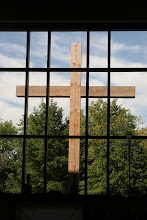And the crowds asked [John the Baptist], "What then should we do?" In reply he said to them, "Whoever has two coats must share with anyone who has none; and whoever has food must do likewise." Even tax collectors came to be baptized, and they asked him, "Teacher, what should we do?" He said to them, "Collect no more than the amount prescribed for you." Soldiers also asked him, "And we, what should we do?" He said to them, "Do not extort money from anyone by threats or false accusation, and be satisfied with your wages." As the people were filled with expectation, all were questioning in their hearts concerning John, whether he might be the Messiah. (Luke 3: 10-14)
Then, this morning, I read about John the Baptist in the gospel of Luke. He was preparing to baptize the crowds. The people had been waiting for a messiah, and when John appeared, gaunt and serious from his time in the wilderness, they wondered if he may be the one. John cleared up their confusion right away, answering them by saying, "I baptize you with water; but one who is more powerful than I is coming; I am not worthy to untie the thong of his sandals. He will baptize you with the Holy Spirit and fire.” (Luke 3: 16)
Jesus was coming. The people were expecting a savior and John was merely the one to prepare the way for him. John was not going to save them, but he did have some suggestions about how they should live as they waited. It was really common sense instruction about how to live in the world, how to get along and care for one another as they anticipated the messiah. It was a message about distraction.
John lived in the desert. He wore simple clothing and ate simple food. It was his call to bring the news of Jesus, and that is what he devoted his life to. He was not distracted by anything. He didn’t suggest that the people live like him, but that they pare down their stuff and live more simply, sharing what they had with those who didn’t have as much, and making room for spiritual things.
He invited them to find their own desert.
In the early Christian era, “there was a Hellenistic notion that provided a romantic nuance to the desert as a place of solitude, to which the weary person of the city could retire in order to regain peace and involve oneself in philosophy or meditation… In Jerome’s Life of Paul, a fictitious work modeled on the Life of Antony, the desert was portrayed as a place inhabited by strange and sympathetic animals, as well as a place of miracles. This kind of writing would generate an enduring literary picture of the desert as the place where God dwells, as the scene of battles of heroic monastic men and women with demons of human passions, and as the paradise regained where humans and beasts dwell in idyllic harmony.” (from Praying with the desert mothers, by Mary Forman Liturgical Press, Saint John’s Abbey, 2005 p 29, 30)
Our stuff won’t save us. We have read enough about that in the newspaper recently. Take some time to find your desert. Give some of your stuff away to someone who needs it. Make some room in your life for spiritual things.
"Prepare the way of the Lord, make his paths straight. Every valley shall be filled, and every mountain and hill shall be made low, and the crooked shall be made straight, and the rough ways made smooth; and all flesh shall see the salvation of God.” (Luke 3: 4b-6)


No comments:
Post a Comment